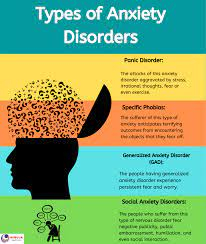



Anxiety states
• Panic disorder
• Generalised anxiety disorder
• Post-traumatic stress disorder (PTSD)
Phobic disorders
• Agoraphobia
• Social phobia
• Simple phobia
Panic Disorder
• There are recurrent attacks of severe anxiety that are sudden and unpredictable. During attacks, physical symptoms are prominent and include palpitations, chest pain, breathlessness, sweating, chills, nausea, trembling, fear of dying or losing control, numbness and feeling of detachment. These last for 10-15 minutes.
• May be accompanied by agoraphobia, an avoidance of situations where a person may feel trapped and unable to escape.
• In between attacks, the patient is free of anxiety.
Generalised Anxiety Disorder
• Characterised by excessive worry and anxiety, which are difficult to control, cause significant distress and impairment and occur on more days than not for at least six months.
• Patients have persistent, excessive and/or unrealistic worry associated with other features including muscle tension, impaired concentration, autonomic arousal, restlessness and insomnia. Complaints of tachycardia, dyspnoea and palpitations are rare.
• Symptoms of anxiety are prominent in psychiatric disorders such as depressive illness and schizophrenia. Many physical illnesses like hyperthyroidism, phaeochromocytoma, hypoglycaemia, alcohol withdrawal and temporal lobe epilepsy can mimic anxiety disorders. Hence, these conditions should be excluded before making a diagnosis of generalised anxiety disorder.
Post-Traumatic Stress Disorder (PTSD)
• PTSD is characterised by recurrent bouts of severe anxiety accompanied by vivid reminiscences (or "flashbacks") of the initial traumatic event.
• PTSD stems from exposure to a traumatic event (e.g. a military experience, a physical or sexual assault, a motor vehicle accident, a natural disaster) that involved actual or threatened death or serious injury to oneself or others.
• Typically, patients re-experience the traumatic event (e.g. nightmares, flashbacks), engage in avoidance of stimuli associated with the sentinel trauma (e.g. impaired recall of events related to the trauma), and experience increased autonomic reactivity (e.g. hypervigilance, irritability, insomnia, heightened startle response).
• PTSD is classified as either acute or chronic (or delayed). In acute PTSD onset of symptoms begins within 6 months of trauma or the duration of symptoms is less than 6 months. In chronic (or delayed) PTSD symptoms start more than 6 months after trauma (delayed) or persist for more than 6 months (chronic).
Phobic Disorders
• Phobic disorders comprise a group of disorders having in common persistently recurring, irrational severe anxiety of specific objects, activities or situations with secondary avoidance behaviour of the phobic stimulus.
• Agoraphobia: The individual has marked fear of and thus avoids being alone or being in public places-e.g. crowds, tunnels and bridges.
• Social phobias: These are persistent irrational fears and the need to avoid any situation, where one might be exposed to scrutiny by others and potentially be embarrassed or humiliated. Even the possibility of such a situation evokes an anticipatory anxiety. The individual is aware that this fear is excessive.
• Simple phobia: The individual experiences significant distress, when confronted with the phobic stimulus or even the possibility of confrontation with the phobic stimulus. The individual may experience symptoms identical to those of panic attacks. Common examples include fear of heights (acrophobia), fear of closed spaces (claustrophobia) and fear of animals.
Treatment
• Psychotherapy.
• Cognitive-behavioural therapy that involves addressing cognitive distortions, psychoeducation, breathing exercises, progressive muscle relaxation and progressive exposure.
TREATMENT AT DR. SOHAN LAL CLINIC
The integrated POLYCLINIC facility offers patients to select their treatment either from the Department of Homeopathy or from the Department of Medicine.
We provide scientific, research-based, and professional services to people across the world, aiming to achieve the highest success rate.
